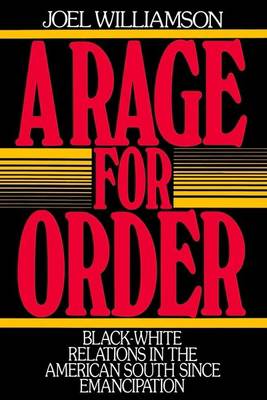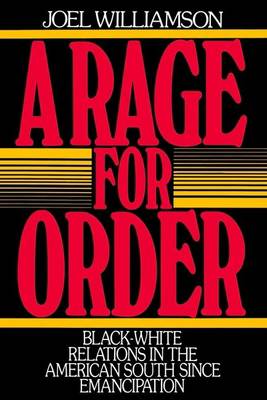
- Afhalen na 1 uur in een winkel met voorraad
- Gratis thuislevering in België vanaf € 30
- Ruim aanbod met 7 miljoen producten
- Afhalen na 1 uur in een winkel met voorraad
- Gratis thuislevering in België vanaf € 30
- Ruim aanbod met 7 miljoen producten
Zoeken
€ 69,45
+ 138 punten
Omschrijving
The Crucible of Race, a major reinterpretation of black-white relations in the South, was widely acclaimed on publication and compared favorably to two of the seminal books on Southern history: Wilbur J. Cash's The Mind of the South and C. Vann Woodward's The Strange Career of Jim Crow. Representing 20 years of research and writing on the history of the South, The Crucible of Race explores the large topic of Southern race relations for a span of a century and a half. Oxford is pleased to make available an abridgement of this parent volume: A Rage for Order preserves all the theme lines that were advanced in the original volume and many of the individual stories. As in Crucible of Race, Williamson here confronts the awful irony that the war to free blacks from slavery also freed racism. He examines the shift in the power base of Southern white leadership after 1850 and recounts the terrible violence done to blacks in the name of self-protection. This condensation of one of the most important interpretations of Southern history is offered as a means by which a large audience can grasp the essentials of black-white relations--a problem that persists to this day and one with which we all must contend--North and South, black and white.
Specificaties
Betrokkenen
- Auteur(s):
- Uitgeverij:
Inhoud
- Aantal bladzijden:
- 336
- Taal:
- Engels
- Reeks:
Eigenschappen
- Productcode (EAN):
- 9780195040258
- Verschijningsdatum:
- 29/05/1986
- Uitvoering:
- Paperback
- Formaat:
- Trade paperback (VS)
- Afmetingen:
- 134 mm x 201 mm
- Gewicht:
- 294 g

Alleen bij Standaard Boekhandel
+ 138 punten op je klantenkaart van Standaard Boekhandel
Beoordelingen
We publiceren alleen reviews die voldoen aan de voorwaarden voor reviews. Bekijk onze voorwaarden voor reviews.







